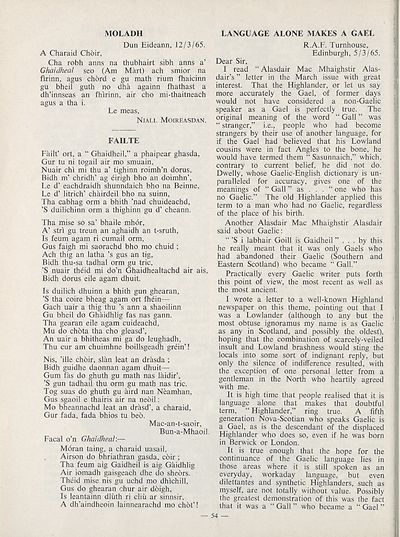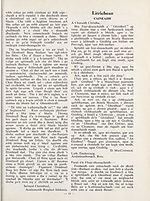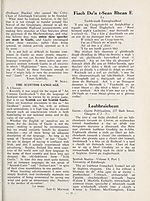An Comunn Gàidhealach Publications > Gaidheal > Volumes 58--62(part), January, 1963--March 1967
(478) Page 54
Download files
Complete book:
Individual page:
Thumbnail gallery: Grid view | List view

MOLADH
Dun Eideann, 12/3/65.
A Charaid Choir,
Cha robh anns na thubhairt sibh anns a’
Ghaidheal seo (Am Mart) ach smior na
flrinn, agus chord e gu math rium fhaicinn
gu bheil guth no dha againn fhathast a
dh’innseas an fhirinn, air cho mi-thaitneach
agus a tha i.
Le meas,
Niall Moireasdan.
FAILTE
Failt’ ort, a “ Ghaidheil,” a phaipear ghasda,
Gur tu ni togail air mo smuain,
Nuair chi mi thu a’ tighinn roimh’n dorus,
Bidh m’ chridh’ ag eirigh bho an doimhn’,
Le d’ eachdraidh shunndaich bho na Beinne,
Le d’ litrich’ chairdeil bho na suinn,
Tha cabhag orm a bhith ’nad chuideachd,
’S duilichinn orm a thighinn gu d’ cheann.
Tha mise so sa’ bhaile mhor,
A’ stri gu treun an aghaidh an t-sruth,
Is feum agam ri cumail orm,
Gus faigh mi saorachd bho mo chuid ;
Ach thig an latha’s gus an tig,
Bidh thu-sa tadhal orm gu trie,
’S nuair theid mi do’n Ghaidhealtachd air ais,
Bidh dorus eile agam dhuit.
Is duilich dhuinn a bhith gun ghearan,
’S tha coire bheag agam ort fhein—
Gach uair a thig thu’s ann a shaoilinn
Gu bheil do Ghaidhlig fas nas gann.
Tha gearan eile agam cuideachd.
Mu do chota tha cho gleasd’,
An uair a bhitheas mi ga do leughadh,
Thu cur am chuimhne boillsgeadh grein’!
Nis, ’ille choir, slan leat an drasda ;
Bidh guidhe daonnan agam dhuit—
Gum fas do ghuth gu math nas laidir’,
’S gun tadhail thu orm gu math nas trie.
Tog suas do ghuth gu aird nan Neamhan,
Gus sgaoil e thairis air na neoil:
Mo bheannachd leat an drasd’, a charaid,
Gur fada, fada bhios tu beo.
Mac-an-t-saoir,
Bun-a-Mhaoil.
Facal o’n Ghaidheal:—
Moran taing, a charaid uasail,
Airson do bhriathran gasda, coir ;
Tha feum aig Gaidheil is aig Gaidhlig
Air iomadh gaisgeach dhe do sheors.
Theid mise nis gu uchd mo dhichill,
Gus do ghearan chur air doigh.
Is leantainn dluth ri cliii ar sinnsir.
A dh’aindheoin lainnearachd mo chot’!
LANGUAGE ALONE MAKES A GAEL
R.A.F. Turnhouse,
Edinburgh, 5/3/65.
Dear Sir,
I read “ Alasdair Mac Mhaighstir Alas-
dair’s ” letter in the March issue with great
interest. That the Highlander, or let us say
more accurately the Gael, of former days
would not have considered a non-Gaelic
speaker as a Gael is perfectly true. The
original meaning of the word “ Gall ” was
“ stranger,” i.e., people who had become
strangers by their use of another language, for
if the Gael had believed that his Lowland
cousins were in fact Angles to the bone, he
would have termed them “ Sasunnaich,” which,
contrary to current belief, he did not do.
Dwelly, whose Gaelic-English dictionary is un¬
paralleled for accuracy, gives one of the
meanings of “ Gall ” as . . . ” one who has
no Gaelic.” The old Highlander applied this
term to a man who had no Gaelic, regardless
of the place of his birth.
Another Alasdair Mac Mhaighstir Alasdair
said about Gaelic:
“ ’S i labhair Goill is Gaidheil ”... by this
he really meant that it was only Gaels who
had abandoned their Gaelic (Southern and
Eastern Scotland) who became “ Gall.”
Practically every Gaelic writer puts forth
this point of view, the most recent as well as
the most ancient.
I wrote a letter to a well-known Highland
newspaper on this theme, pointing out that I
was a Lowlander (although to any but the
most obtuse ignoramus my name is as Gaelic
as any in Scotland, and possibly the oldest),
hoping that the combination of scarcely-veiled
insult and Lowland brashness would sting the
locals into some sort of indignant reply, but
only the silence of indifference resulted, with
the exception of one personal letter from a
gentleman in the North who heartily agreed
with me.
It is high time that people realised that it is
language alone that makes that doubtful
term, “ Highlander,” ring true. A fifth
generation Nova-Scotian who speaks Gaelic is
a Gael, as is the descendant of the displaced
Highlander who does so, even if he was born
in Berwick or London.
It is true enough that the hope for the
continuance of the Gaelic language lies in
those areas where it is still spoken as an
everyday, workaday language, but even
dilettantes and synthetic Highlanders, such as
myself, are not totally without value. Possibly
the greatest demonstration of this was the fact
that it was a “ Gall ” who became a “ Gael ”
Dun Eideann, 12/3/65.
A Charaid Choir,
Cha robh anns na thubhairt sibh anns a’
Ghaidheal seo (Am Mart) ach smior na
flrinn, agus chord e gu math rium fhaicinn
gu bheil guth no dha againn fhathast a
dh’innseas an fhirinn, air cho mi-thaitneach
agus a tha i.
Le meas,
Niall Moireasdan.
FAILTE
Failt’ ort, a “ Ghaidheil,” a phaipear ghasda,
Gur tu ni togail air mo smuain,
Nuair chi mi thu a’ tighinn roimh’n dorus,
Bidh m’ chridh’ ag eirigh bho an doimhn’,
Le d’ eachdraidh shunndaich bho na Beinne,
Le d’ litrich’ chairdeil bho na suinn,
Tha cabhag orm a bhith ’nad chuideachd,
’S duilichinn orm a thighinn gu d’ cheann.
Tha mise so sa’ bhaile mhor,
A’ stri gu treun an aghaidh an t-sruth,
Is feum agam ri cumail orm,
Gus faigh mi saorachd bho mo chuid ;
Ach thig an latha’s gus an tig,
Bidh thu-sa tadhal orm gu trie,
’S nuair theid mi do’n Ghaidhealtachd air ais,
Bidh dorus eile agam dhuit.
Is duilich dhuinn a bhith gun ghearan,
’S tha coire bheag agam ort fhein—
Gach uair a thig thu’s ann a shaoilinn
Gu bheil do Ghaidhlig fas nas gann.
Tha gearan eile agam cuideachd.
Mu do chota tha cho gleasd’,
An uair a bhitheas mi ga do leughadh,
Thu cur am chuimhne boillsgeadh grein’!
Nis, ’ille choir, slan leat an drasda ;
Bidh guidhe daonnan agam dhuit—
Gum fas do ghuth gu math nas laidir’,
’S gun tadhail thu orm gu math nas trie.
Tog suas do ghuth gu aird nan Neamhan,
Gus sgaoil e thairis air na neoil:
Mo bheannachd leat an drasd’, a charaid,
Gur fada, fada bhios tu beo.
Mac-an-t-saoir,
Bun-a-Mhaoil.
Facal o’n Ghaidheal:—
Moran taing, a charaid uasail,
Airson do bhriathran gasda, coir ;
Tha feum aig Gaidheil is aig Gaidhlig
Air iomadh gaisgeach dhe do sheors.
Theid mise nis gu uchd mo dhichill,
Gus do ghearan chur air doigh.
Is leantainn dluth ri cliii ar sinnsir.
A dh’aindheoin lainnearachd mo chot’!
LANGUAGE ALONE MAKES A GAEL
R.A.F. Turnhouse,
Edinburgh, 5/3/65.
Dear Sir,
I read “ Alasdair Mac Mhaighstir Alas-
dair’s ” letter in the March issue with great
interest. That the Highlander, or let us say
more accurately the Gael, of former days
would not have considered a non-Gaelic
speaker as a Gael is perfectly true. The
original meaning of the word “ Gall ” was
“ stranger,” i.e., people who had become
strangers by their use of another language, for
if the Gael had believed that his Lowland
cousins were in fact Angles to the bone, he
would have termed them “ Sasunnaich,” which,
contrary to current belief, he did not do.
Dwelly, whose Gaelic-English dictionary is un¬
paralleled for accuracy, gives one of the
meanings of “ Gall ” as . . . ” one who has
no Gaelic.” The old Highlander applied this
term to a man who had no Gaelic, regardless
of the place of his birth.
Another Alasdair Mac Mhaighstir Alasdair
said about Gaelic:
“ ’S i labhair Goill is Gaidheil ”... by this
he really meant that it was only Gaels who
had abandoned their Gaelic (Southern and
Eastern Scotland) who became “ Gall.”
Practically every Gaelic writer puts forth
this point of view, the most recent as well as
the most ancient.
I wrote a letter to a well-known Highland
newspaper on this theme, pointing out that I
was a Lowlander (although to any but the
most obtuse ignoramus my name is as Gaelic
as any in Scotland, and possibly the oldest),
hoping that the combination of scarcely-veiled
insult and Lowland brashness would sting the
locals into some sort of indignant reply, but
only the silence of indifference resulted, with
the exception of one personal letter from a
gentleman in the North who heartily agreed
with me.
It is high time that people realised that it is
language alone that makes that doubtful
term, “ Highlander,” ring true. A fifth
generation Nova-Scotian who speaks Gaelic is
a Gael, as is the descendant of the displaced
Highlander who does so, even if he was born
in Berwick or London.
It is true enough that the hope for the
continuance of the Gaelic language lies in
those areas where it is still spoken as an
everyday, workaday language, but even
dilettantes and synthetic Highlanders, such as
myself, are not totally without value. Possibly
the greatest demonstration of this was the fact
that it was a “ Gall ” who became a “ Gael ”
Set display mode to:
![]() Universal Viewer |
Universal Viewer | ![]() Mirador |
Large image | Transcription
Mirador |
Large image | Transcription
| An Comunn Gàidhealach > An Comunn Gàidhealach Publications > Gaidheal > Volumes 58--62(part), January, 1963--March 1967 > (478) Page 54 |
|---|
| Permanent URL | https://digital.nls.uk/127154517 |
|---|
| Description | This contains items published by An Comunn, which are not specifically Mòd-related. It includes journals, annual reports and corporate documents, policy statements, educational resources and published plays and literature. It is arranged alphabetically by title. |
|---|
| Description | A collection of over 400 items published by An Comunn Gàidhealach, the organisation which promotes Gaelic language and culture and organises the Royal National Mòd. Dating from 1891 up to the present day, the collection includes journals and newspapers, annual reports, educational materials, national Mòd programmes, published Mòd literature and music. |
|---|---|
| Additional NLS resources: |
|

